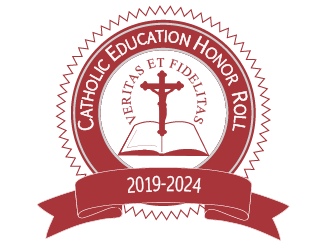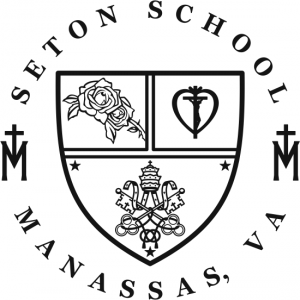An Academic Commitment
The end of Catholic education is the Glory of God. Therefore, true Catholic education should be committed to academic excellence, leading each student to develop his intellectual abilities to the highest possible extent so that he can use them in the service of Christ and His Church.
Modern education in all subject matter areas and at all levels has been watered down on the premise that the child can’t learn “hard things”. But this lowering of standards betrays a lack of respect for the child, and such disrespect has no place in Catholic education.
Seton education challenges the child to do his best. Essay tests and term papers are the norm in the high school classes and the courses in the lower grades prepare the child for the high school curriculum.
The commitment to academic excellence is reflected in the Seton School curriculum. In the past, Catholic education on the secondary level was rarely co-educational and this traditional practice had many advantages. There are also advantages to co-education. At Seton, we believe we offer the best of both by sectioning some classes all boys or all girls.

 Program Overview
Program Overview
Seton School requires its students to complete a rigorous course of studies designed to prepare them to succeed in challenging college coursework. Included in this curriculum are several college-level courses that, while not official AP courses, consistently enable the students to take AP exams in the areas of Biology, Calculus, Chemistry, Computer Science, English Language and Literature, European History, Latin, US Government, US History, and Physics with success. An average of 25% of the graduating seniors in the classes of 2019-2023 took one or more AP exams during their years at Seton School. 70% of exams taken in 2022 and 2023 received scores of 3 or higher.
Academic Departments
All students, including non-Catholics, must take religion each year.
Junior High Curriculum
Scripture, doctrine, lives of the Saints, prayers and devotions, the Ten Commandments and Christian moral principles, preparation for the Sacrament of Confirmation.
Senior High Curriculum
4 credits are required for graduation. All courses with an *asterisk are required.
*Religion 9 – Basic doctrine and apologetics.
*Religion 10 – Christian morality and scripture.
*Religion 11 – Sacred scripture.
*Religion 12 – Advanced doctrine and apologetics, bioethics, marriage and the family, spiritual life.
Faith and Finance – Practical life skills (New Evangelization, personal finance, job skills, the just society, personal spiritual life – Juniors and Seniors Only).
Theology of the Body & the Spiritual Life (Juniors and Seniors Only).
Junior High Curriculum
Separate classes in reading and grammar; composition skills, research, vocabulary, and spelling.
Senior High Curriculum
6 credits are required for graduation. All courses with an *asterisk are required.
*Grammar 9 – Grammar and vocabulary.
*English 9 – Introduction to literary analysis, composition, public speaking and vocabulary.
*English 10 – American Literature, composition, vocabulary, grammar.
*English 11 – World Literature, expository writing.
*Language and Logic – Vocabulary, grammar, SAT prep, logic.
*English 12 – British literature, research paper.
Speech – Public speaking and debate.
Writing for Publication – Journalism (production of school newspaper) & creative writing for school literary journal.
Junior High Curriculum
World Culture classes offered each year in a two-year cycle covering many major countries of the world includes history, geography, and culture. A separate Geography class is offered in 8th grade.
Senior High Curriculum
3 credits are required including either American Hist or American Govt for students through the Class of 2024 – 4 credits are required (including American History AND American Govt) beginning with the Class of 2025.
World History – Ancient, medieval, and modern history.
American History – History of the church in America.
History of the 20th Century Europe – 20th and 21th century history.
American Government – History, structure, and workings of our American democratic republic and the application of Catholic social teaching.
Economics – An introduction to the key concepts of micro and macro economics.
Junior High Curriculum
General math, pre-algebra, algebra I and II, geometry; offered according to student’s qualifications in ability-grouped classes.
Senior High Curriculum
3 credits are required for graduation. 4 or more credits are recommended. All courses with an *asterisk are required
*Algebra I
*Geometry and Trigonometry
*Algebra II or Algebra II Advanced
Pre-Calculus and Analytic Geometry
Calculus I & II
Statistics Dual Enrollment (MTH157) HS and college credit. Algebra II and Pre-Calculus are prerequisites; Calculus is strongly encouraged and can be taken concurrently.
Junior High Curriculum
Life Science with lab activities and science fair. Introduction to Physical Science.
Senior High Curriculum
3 credits are required . 4 or more credits are recommended. All students are required to participate in the Science Fair for graduation. (all are lab science classes)
Earth and Space Science
*Biology OR Advanced Biology – participation in the Science Fair included
Chemistry I & II
Physics
Introduction to Engineering Dual Enrollment (EGR210) HS and college credit. Physics and Chemistry prerequisites, plus Calculus (may be taken concurrently). Advanced physics, engineering software, robotics.
Advanced Lab Sciences – Seniors only. Prerequisites: Biology and one other high school science. Forensic science, genetics, anatomy & physiology, environmental sciences.
Information Technology – PC based instruction, introduction to computers, Microsoft Office Suite (Word, Excel, PowerPoint, and Access), typing, cyber security, online safety.
3D Printing – 1/2 Semester course – Introductory course in 3-Dimensional printing.
Python – 1/2 Semester course – Computer programming course for logical thinking students.
Junior High Curriculum
Latin, German, and Spanish are available to qualified students.
Senior High Curriculum
Students are required to take Latin I and two consecutive years of the same modern language OR Latin I and Latin II, plus either Latin III or another language. 3 credits are required but 4 are strongly recommended. A 75%+ average is required in the previous level to proceed to the next level of a language. All courses with an *asterisk are required.
Latin: *I, II, III, IV
Spanish: I, II, III, Spanish 201 & 202 Dual Enrollment (SPA201 & 202) HS and college credit.
German: I, II, III, IV
French I, II, III, IV
Junior High Curriculum
Life Skills, Art, Band, and Chorus are available for Junior High students if their schedule permits.
Senior High Curriculum
Art I and Art Appreciation I and Art II
Band: Beginning, Intermediate, and Advanced – No prior musical experience required for beginning band. Beginning course includes basic skills necessary to read and perform band music. Some instruments may be available for loan by contacting Miss Erwin. In subsequent courses students will improve their skills within a concert band setting.
Chorus: I and II – Students will sing popular, traditional, and sacred music
2024-2025 Course Scheduling
Course Scheduling for the 2024-2025 School Year has begun! Workshops will take place during the student's English class. See the schedule below. -An overall grade point average of 77% and 26 credits are required for graduation. -Prerequisites: Students may not sign...
Dual Enrollment Information – College Credit for Seton Courses
In cooperation with Northern Virginia Community College, eligible Seton students can receive both high school and college credit. For these Dual Enrollment (DE) courses, students will be registered at NVCC but are taught at Seton by our teachers. There is no additional tuition, but students might need to pay for college textbooks. These courses are not necessarily more difficult than other Seton upper level courses.
To enroll, NVCC requires minimum SAT or PSAT test scores which many of our students meet or surpass. Students who don’t meet those standards may qualify by taking an NVCC placement test. In many cases, a separate NVCC exam is also required. Most Seton students will not have the other prerequisites for the courses until their senior year, but some juniors will qualify.
Statistics DE (MTH 245, 3 college credits)
Seton’s Statistics DE is taught by Mrs. Vickie Zadnik. Algebra II and Pre-Calculus are prerequisites and Calculus is recommended and can be taken concurrently. Students will need to take an additional math exam to qualify for this class.
- We are in a data driven world, the need for basic understanding of statistics reaches across all disciplines. Most all general education requirements require a math course. This course would meet this requirement in most cases. For majors that require more advanced math in their gen-eds, they more often are requiring a 3000 level statistics course specific to that major. This dual enrollment class would give them a good foundation to take that advanced course.
- This is a college level course so students need to be prepared for the rigor and be willing to put the effort into it to be successful.
- Students need to have taken pre-calc but should be encouraged to be also taking calculus while taking stats if they have not already had calculus. Also students should have an A or B math average.
- There is no tuition fee for this course but the materials fee is about $100 plus spending about $20 – $40 for a used textbook is highly encouraged.
Vickie Zadnik
[email protected]
Spanish DE 201/202 (SPAN 201/202, 6 college credits)
Spanish DE 201/202 is taught by Mrs. Ann Martella. Spanish III is a prerequisite. This course covers Spanish DE 201 first semester and then Spanish DE 202 second semester so it is more intense than Spanish DE 201. Candidates also must pass a written and oral Spanish test given by NVCC at Seton in the late spring.
Mrs. Ann Martella
[email protected]
Introduction to Engineering DE (EGR 120, 2 college credits)
Mr. Mark Hoffman
[email protected]
Junior High Graduation Requirements
If a new junior high student has a grade average below 68% at the end of the semester, or an old student has an average below 70%, a conference may be held with the parents to determine whether the student should continue at Seton. Any seventh grade student with a grade average of 77% or above at the end of the year is eligible for promotion to the eighth grade. If a seventh grade student has a grade average between 70%-77%, a conference may be held with the parents to determine whether the student should repeat the grade or make up classes in summer school. A seventh-grade student with an average of 69% or lower in required courses at the end of the academic year shall have the option to repeat the grade or will be asked not to return to Seton. For admission into Seton’s ninth grade, an eighth grade student must complete the eighth grade year with an overall grade average of 77% or above (before summer school), must not have received any suspensions during the eighth grade year, and must be recommended by the eighth grade faculty. Students who do not meet these requirements may be admitted into the ninth grade on probation or may be asked not to return to Seton. All failed junior high classes must be made up in summer school, unless an alternative is approved by the Director.
High School Graduation Requirements
A minimum of 26 academic credits in high school subjects is required for graduation. A student must achieve an overall grade average of 77% to graduate. In addition, all students must participate in one Science Fair and all seniors are required to participate in a pro-life speech competition. Seton requires a residency year, in which a minimum of five courses must be taken at Seton School itself. This would ordinarily be the senior year, but a student who attended full time during the junior year could consider that to be his residency year, and be eligible to attend part time in his senior year. A student must take Religion 11, Religion 12, Language and Logic 11, and English 12 on campus in order to receive a Seton diploma. A senior who fails one or both of the senior classes may retake them in home study, summer school or an equivalent college level course approved by the Director. If a senior is taking a home school course required for graduation, all of the work must be completed by April 15 of the senior year. If it is not, the student will not be allowed to receive a diploma earlier than June 15, regardless of when the work is actually completed. Students who have not met the graduation requirements may attend commencement exercises, and may receive a certificate of achievement, but not a diploma.
